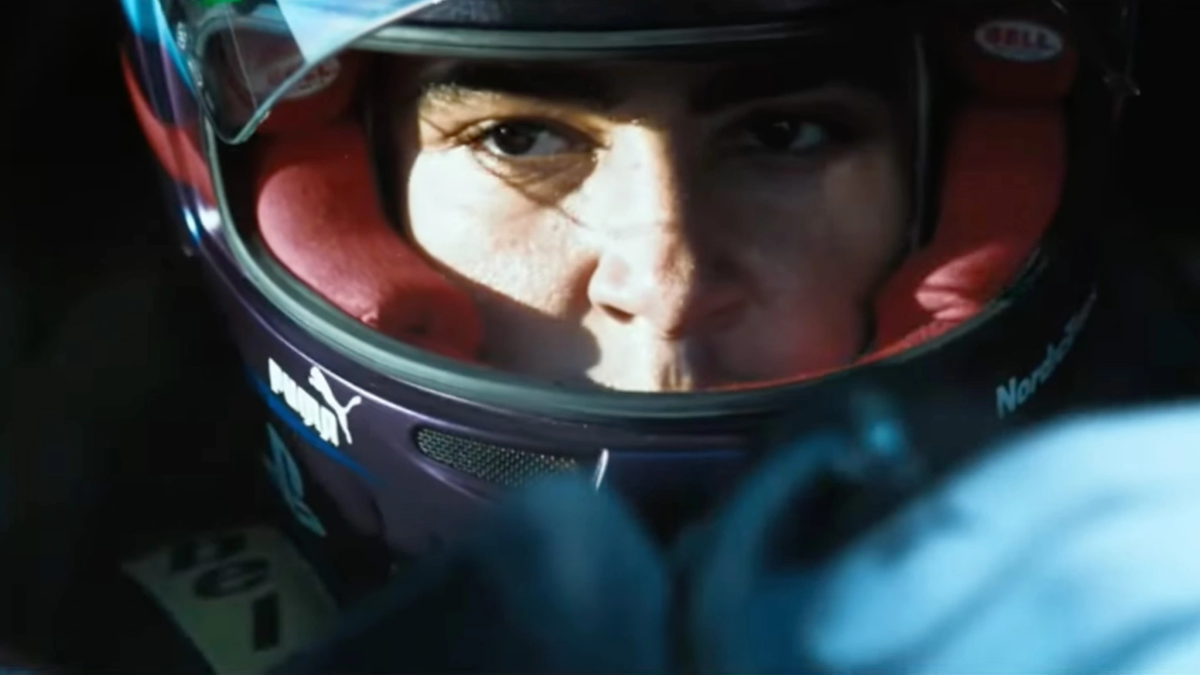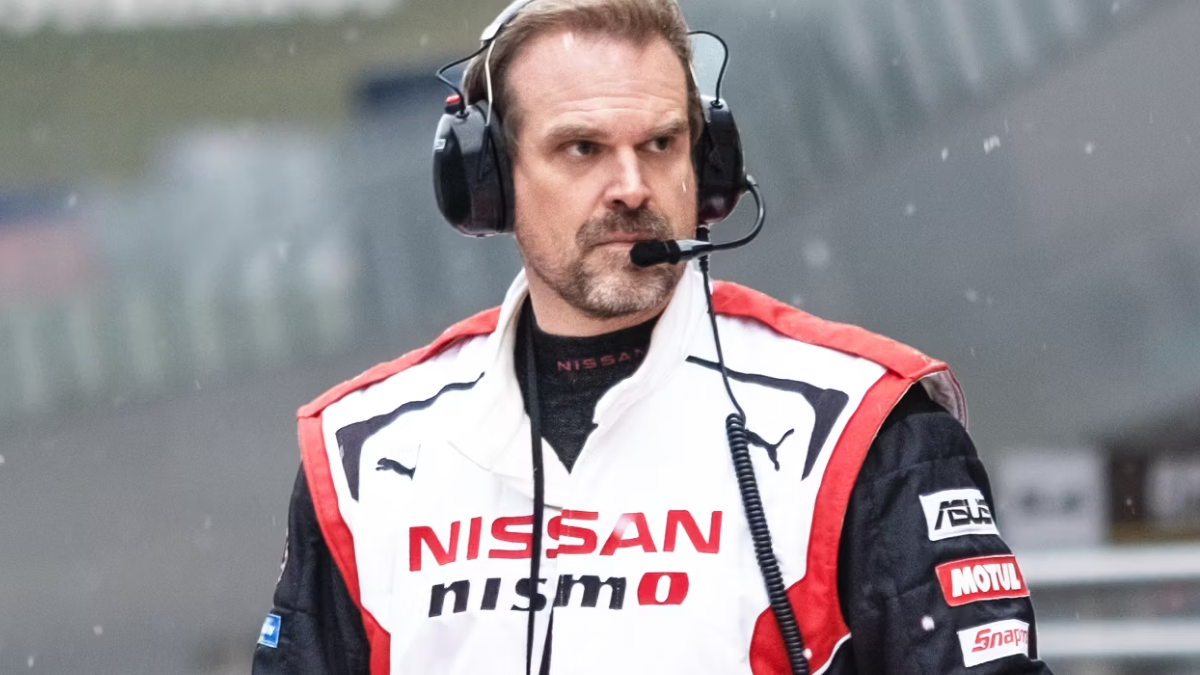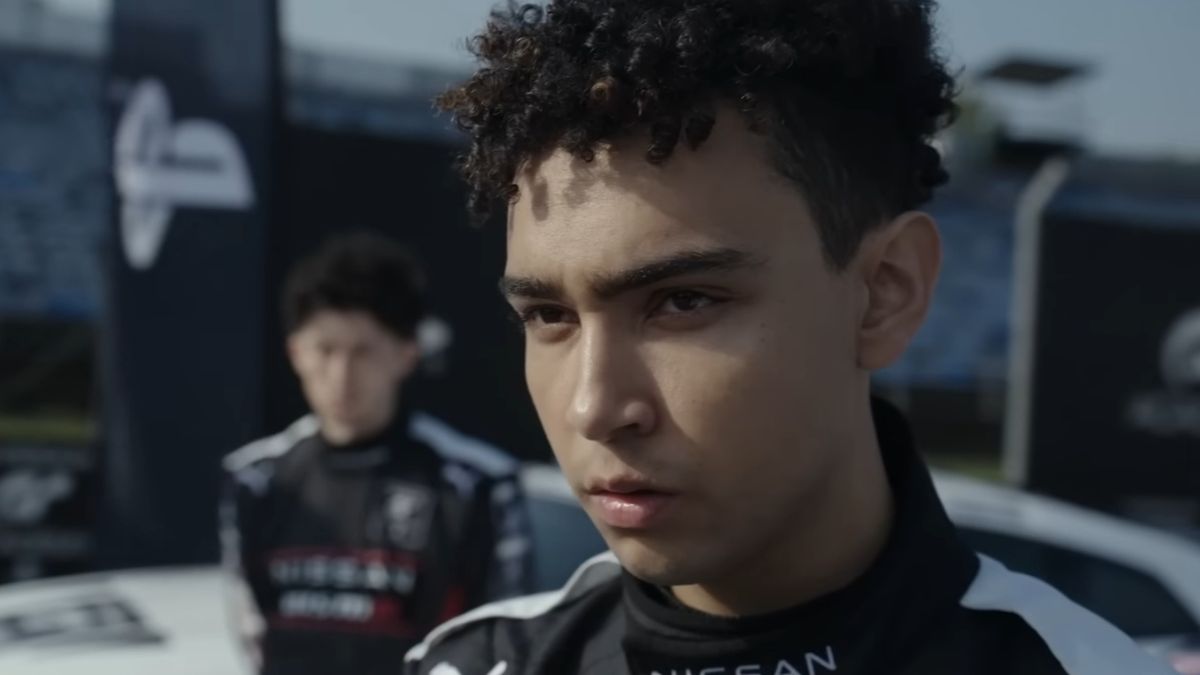Gran Turismo may not be up there with some of the all-time greatest sports movies ever made, but you may be surprised by just how tightly you will be gripping your chair as it really steps into a higher gear in the second half.
As the marketing has no doubt made you aware already, Gran Turismo follows the true story of gamer turned real-life race car driver Jann Mardenborough, played by Archie Madekwe. The Neill Blomkamp-directed film traces Jann’s unlikely rise from a committed and talented player of the titular video game series to getting the chance through a gaming competition to train for the real sport.
In the first 30-40 minutes, we’re introduced to the major players of the story — Orlando Bloom’s Danny Moore, David Harbour’s Jack Salter, and Jann — in a way that feels way too throat-cleary to justify the lengthy runtime it takes to establish the characters. The agonizing opening act is riddled with clichéd dialogue and a forced conflict between Jann and his father – Djimon Hounsou’s Steve Mardenborough – who disapproves of his son’s interest in both gaming and racing for reasons that seem thin at best. We’re also inundated with a few boring exposition dumps for scenes with the Nissan businessman Danny at its center, including a dry presentation with investors.

A glimmer of truly compelling characterization does happen when Harbour’s Salter, a racing engineer, is introduced. When Danny comes to recruit Jack to help run the Gran Turismo Academy, the latter is understandably hesitant. Even though some of Harbour’s dialogue in this scene is also par for the course in many ways, he brings a certain charisma to the role that elevates the material. In fact, he ends up being the most memorable actor in the movie.
Those early scenes also feature some visuals that just don’t work at all. The moments of Jann in his house often come across like a DSLR-filmed student project at times, while the business meetings with Danny also feel empty and cold. And then there’s the fact that when Jann is playing the Gran Turismo video game, we are brought into the gamer’s head by way of seeing a 3D CGI car being constructed around him as he is playing, which just comes across as a lot of cluttered gobbledygook on the screen. There is one part where he is immersed in the world of the CGI game, but it looks less realistic than what you might typically expect from actual PlayStation gameplay footage that he’s supposed to be playing.
Both the subplot with the father and the romance between Jann and Maeve Courtier-Lilley’s Audrey feel like they’ve been completely swept under the rug once we get into the second half of the movie, leaving you wondering why they didn’t just cut those parts out entirely.
However, once we get into the GT Academy scenes and the rubber hits the road in the real-life racing scenes, so many of the setbacks from the first 40 minutes of the movie get smaller and smaller in the rearview. In many ways, it might have been better to start the movie off right then and there, because that is when it truly gets the most exciting, both in terms of the action that unfolds in the racing scenes and the character development stuff.
Danny is constantly struggling with Jack about Jann’s lack of media savvy, and it makes for an interesting conflict akin to Rocky II, when Sylvester Stallone’s character is grappling with the pitfalls of overnight fame.
Where this movie really shines are the racing scenes. With each subsequent scene, it gets more and more high stakes to the point of being genuinely tension-filled.
To much surprise, the Jack character has a fascinating dynamic that unfolds with Jann throughout the course of the movie. While you can appreciate that the quality of the film seemed to go up with each subsequent scene, it just made the flaws in the first half that much more apparent. The father-son conflict was done so much better, making Hounsou’s albeit committed performance that much more obsolete.

Overall, there is a shining diamond of an hour-and-a-half movie buried somewhere in this bloated two hour and 15 minute runtime. However, it isn’t a total loss. Since each scene seems to build upon the next, and the direction seems more assured as the narrative progresses, you may find yourself won over by the time the final race concludes.
Despite an at-times meandering and run-of-the-mill script by Jason Hall, Zach Baylin, and Alex Tse, there is some entertainment value found in this movie, and some surprisingly emotional moments near the end.
Even the CGI visualization representing Jann’s consciousness becomes more subtle once he begins his journey on the race track. The CGI visuals mostly get relegated to some minor labeling of which car is in what place, and hypothetical car paths that wouldn’t seem out of place in a sports broadcast. The full-blown CGI car deconstruction even makes a comeback in the very last race, in a call back to those opening scenes, but in a way that’s much more compelling this time around.
Other than that, you can tell much of the movie is filmed with practical stunts, and it is impressive to behold. There is even a note at the end letting audiences know the real-life race car driver on which the film is based, Jann Mardenborough, served as the stunt driver for the movie.
The rhythmic synth-fueled music by Lorne Balf and Andrew Kawczynski and the swooping drone shots by director of photography Jacques Jouffret help to squeeze the sweat from your palms in the more high-intensity racing scenes. The editing by Austyn Daines, Eric Freidenberg, and Colby Parker Jr. is also a point of praise for the way it alternates between quick shots of the engine’s pistons exploding, wide-angle views of cars rounding corners, and Jann’s reactions during races.
Both Bloom and Madekwe give serviceable enough performances, but neither one rises above the sometimes stale material they are given on the page in terms of characterization. It comes close to being a star-making turn for Madekwe, especially for an emotional hospital scene when he comes to know the truth of a tragedy he is involved in. However, the film seems to point more toward Madekwe’s potential rather than truly giving him the stage to fully shine. Meanwhile, Harbour is the ace in the hole whose performance helps to glue the disparate parts of the movie together.
Even though Gran Tursimo falls short of the bar in terms of being the Rocky of race car movies that it could have been, due to the character development falling short in all of the scenes that take place outside the racetrack, it’s still an enjoyable ride, overall. If you are a fan of the sport or the game, this is probably one you’ll want to race out to the theaters to go and see. If those genres aren’t your thing, though, a slow roll to your nearest streaming service is still recommended once it hits the small screen for the action scenes alone.
Fair
Though it is slowed down by a cliché-ridden opening act, 'Gran Turismo' is an ultimately rewarding experience once the rubber hits the road in the tension-filled second half. The film rises above the sum of its parts thanks to an infectiously inspiring premise and a fantastic performance by David Harbour.

